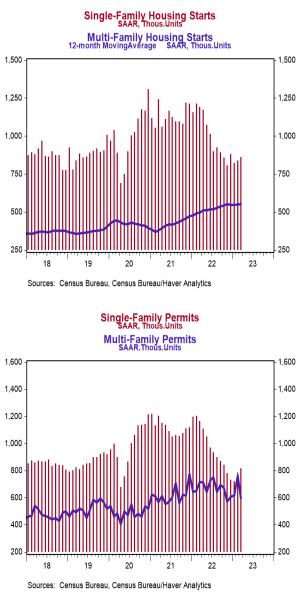- Housing starts declined 0.8% in March to a 1.420 million annual rate, beating the consensus expected 1.400 million. Starts are down 17.2% versus a year ago.
- The drop in March was entirely due to multi-unit starts. Single-family starts increased. In the past year, single-family starts are down 27.7% while multi-unit starts are up 6.5%.
- Starts in March fell in the West and Midwest but rose in the Northeast and South.
- New building permits declined 8.8% in March to a 1.413 million annual rate, below the consensus expected 1.450 million. Compared to a year ago, permits for single-family homes are down 29.7% while permits for multi-unit homes are down 16.9%.
Implications:
Residential construction fell slightly in March as developers continue to navigate a challenging housing market. Looking at the details, multi-unit construction was the reason for the decline. Meanwhile single-family starts rose 2.7% for the month, rising for a second month in a row for the first time since 2021. While it’s clear that 30-year mortgage rates hovering near 7% continue to make developers cautious about investing, it does look like single-family construction has found at least a temporary bottom. One reason may be that some of the sticker shock from the rapid run-up in financing costs last year is beginning to wear off. In fact, yesterday’s reading on homebuilder sentiment, as measured by the NAHB Housing Index, rose to 45 in April from 44 in March. This is the fourth consecutive gain following the longest streak of declines since records began in 1985. That said, an index reading below 50 still signals that more builders view conditions as poor versus good. Though groundbreaking on new residential projects is down 17.2% from a year ago, keep in mind that construction overall has hardly ground to a halt. Lots of projects were already in the pipeline, with the number of homes under construction hovering near the highest level on record back to 1970. These figures also demonstrate a slower construction process due to a lack of workers. Given that builders already have their hands full, it was not surprising to see permits for new projects fall 8.8% in March. While we don’t think housing is going to be a source of economic growth in the year ahead, recent numbers are not what you’d expect to see if there was a housing bust like the 2000s on the way, either. In other recent news, the Empire State Index, a measure of New York factory sentiment, surged unexpectedly to +10.8 in April from -24.6 in March, posting the first positive reading in five months. We will be following other regional surveys closely to look for other signs of revival in manufacturing. For now, don’t get your hopes up.





